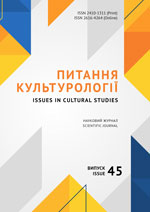Цифрова культурна політика Великої Британії: історичні аспекти та основні питання
DOI:
https://doi.org/10.31866/2410-1311.45.2025.325018Ключові слова:
Велика Британія, культурні сектори, цифрова культура, цифрова культурна політика, цифрові інновації, цифрова інклюзія, культурні індустріїАнотація
Мета статті — розглянути історичні аспекти й основні питання, пов’язані з формуванням цифрової культурної політики у Великій Британії в першій третині ХХІ ст. Результати дослідження. Наголошено, що поглиблена конвергенція цифровізації та глобалізації впродовж останніх десятиліть є важливим чинником реформування культурної політики, а формування нової екосистеми цифрової культури, особливо на постковідному етапі, актуалізувало пошуки надійних платформ культурної політики, які дають змогу урядовим і неурядовим організаціям, пов’язаним з культурними секторами, максимально залучити інновації та забезпечити приріст знання. Наукова новизна дослідження полягає в тому, що вперше розглянуто британський кейс цифрової культурної політики в українському культурологічному дослідницькому полі з акцентом на потенціал цифрових інновацій у процесі розширення внутрішнього та міжнародного охоплення культурних секторів країни. Висновки. Наразі Велика Британія є однією з передових країн у світі, де чітко усвідомлюють важливість підтримки цифрової діяльності, спрямованої на охоплення аудиторії, інновації у сфері художнього виробництва або розвиток ефективних бізнес-практик. Фокусування уваги на цифрових розробках як ефективних інструментах для британських культурного ринку та м’якої сили свідчить, що британці пов’язують пріоритети цифрової культурної політики країни з її міжнародним іміджем, а масштаб досліджень у цьому напрямі та політичної підтримки, попри наявні виклики та проблеми, не лише демонструє важливість партнерської роботи (між урядовими та неурядовими структурами), а й постає своєрідним прикладом для інших країн, враховуючи Україну, що працюють над власними стратегіями розвитку культурного та креативного секторів.
Посилання
Alma Economics. (2023). Review of the Culture Sector Evidence Base in Wales: Phase 2 report (Report number 101/2023). Welsh Government. https://www.gov.wales/sites/default/files/statistics-and-research/2023-11/review-of-the-culture-sector-evidence-base-in-wales-phase-2-report.pdf [in English].
Bakhshi, H., & Throsby, D. (2012). New technologies in cultural institutions: theory, evidence and policy implications. International Journal of Cultural Policy, 18(2), 205–222. https://doi.org/10.1080/10286632.2011.587878 [in English].
Communications and Digital Committee. (2023a). At risk: our creative future (2nd Report of Session 2022–23). House of Lords. https://publications.parliament.uk/pa/ld5803/ldselect/ldcomm/125/125.pdf [in English].
Communications and Digital Committee. (2023b). Digital exclusion (3rd Report of Session 2022–23). House of Lords. https://publications.parliament.uk/pa/ld5803/ldselect/ldcomm/219/219.pdf [in English].
Department for Digital, Culture, Media & Sport. (2017, March 1). UK Digital Strategy 2017. Gov.uk. https://www.gov.uk/government/publications/uk-digital-strategy/uk-digital-strategy [in English].
Department for Digital, Culture, Media & Sport. (2018a, March 7). Culture Is Digital. Gov. uk. https://www.gov.uk/government/publications/culture-is-digital/culture-is-digital [in English].
Department for Digital, Culture, Media & Sport. (2018b, May 17). DCMS areas of research interest. Gov.uk. https://www.gov.uk/government/publications/dcms-areas-of-research-interest/dcms-areas-of-research-interest [in English].
Department for Digital, Culture, Media & Sport. (2019). Culture is Digital: June 2019 progress report. Gov.uk https://www.gov.uk/government/publications/culture-is-digital/culture-is-digital-june-2019-progress-report [in English].
Department for Digital, Culture, Media & Sport. (2021). Boundless Creativity : culture in a time of Covid-19 (Boundless Creativity report). Gov.uk. https://assets.publishing.service.gov.uk/government/uploads/system/uploads/attachment_data/file/1005410/Boundless_Creativity_v1.pdf [in English].
Department for Digital, Culture, Media & Sport. (2022, 13 June). UK Digital Strategy. Gov.uk. https://www.gov.uk/government/publications/uks-digital-strategy/uk-digital-strategy [in English].
Department for Digital, Culture, Media & Sport. (2023). Creative Industries Sector Vision: A joint plan to drive growth, build talent and develop skills. Gov.uk. https://assets.publishing.service.gov.uk/media/64898de2b32b9e000ca96712/Creative_Industries_Sector_Vision__accessible_version_.pdf [in English].
Department for Digital, Culture, Media & Sport. (n.d.). About us. Gov.uk. https://www.gov.uk/government/organisations/department-for-digital-culture-media-sport/about [in English].
Hesmondhalgh, D. (2002). The Cultural Industries. Sage. https://www.researchgate.net/publication/261554803_The_Cultural_Industries_3rd_Ed [in English].
Holcombe-James, I. (2022). Digital access, skills, and dollars: applying a framework to digital exclusion in cultural institutions. Cultural Trends, 31(3), 240–256. https://doi.org/10.1080/09548963.2021.1972282 [in English].
Hylland, O. M. (2022). Digital cultural policy. The story of a slow and reluctant revolution. International Journal of Cultural Policy, 28(7), 813–828. https://doi.org/10.1080/10286632.2022.2137148 [in English].
Hylland, O. M., & Primorac, J. (2023). Introduction: The digitalization of cultural policy. In O. M. Hylland & J. Primorac (Eds.), Digital Transformation and Cultural Policies in Europe (pp. 1–7). Routledge. https://doi.org/10.4324/9781003334576-1 [in English].
KEA European Affairs. (2024, April 30). KEA takes part in a study on “Discoverability of diverse European content in the digital environment” for the European Commission. https://keanet.eu/kea-takes-part-in-a-study-on-discoverability-of-diverse-european-content-in-the-digital-environment-for-the-european-commission/ [in English].
Maturity Levels. (n.d.). Digital Culture Compass. https://digitalculturecompass.org.uk/maturity-levels [in English].
Misek, R., Leguina, A., & Manninen, K. (2022). Digital Access to Arts and Culture. University of Kent. https://repository.lboro.ac.uk/articles/report/Digital_access_to_arts_and_culture/20025731?file=35753183 [in English].
Morris, F. (2022, February 9). Building on the positives. Arts Professional. https://www.artsprofessional.co.uk/magazine/article/building-positives [in English].
MTM. (2016). Digital Culture How the Digital R&D Fund for the Arts impacted the arts and cultural sector. https://www.culturehive.co.uk/wp-content/uploads/2017/02/How-the-Digital-RD-Fund-for-the-Arts-impacted-the-arts-and-cultural-sector-v41.pdf [in English].
MTM. (2019). Digital Culture 2019. https://media.nesta.org.uk/documents/Digital-Culture-2019.pdf [in English].
Oman, S. (2021). Understanding Well- being Data Improving Social and Cultural Policy, Practice and Research. Palgrave Macmillan. https://doi.org/10.1007/978-3-030-72937-0 [in English].
Oman, S. (2024). Digital culture - a review of evidence and experience, with recommendations for uk policy, practice and research. Findings and recommendations from an AHRC-DCMS Fellowship in Digital and International (2022-2024). DCMS. https://assets.publishing.service.gov.uk/media/6724eb3ec053e87b6a0a824a/Digital_culture_report_2024__3_-accessible.pdf [in English].
Rex, B., Kaszynska, P., & Kimbell, L. (2019). Business Models for Arts and Cultural Organisations: Research Findings From Creative Lenses. Trans Europe Halles. https://www.researchgate.net/publication/342947196_Business_Models_for_ Arts_and_Cultural_Organisations_Research_Findings_from_Creative_Lenses [in English].
SQW. (2021). Evaluation of Arts Council England’s Digital Culture Network Final Evaluation Report - Executive Summary. https://digitalculturenetwork.org.uk/wp-content/uploads/2022/03/ACE-DCN-final-report-exec-summary-public-version.pdf [in English].
Unitt, C. (2018). Defining digital for cultural organisations. https://chrisunitt.co.uk/defining-digital-cultural-organisations/ [in English].
Wright, D. (2022). How culture became digital: editor’s introduction. International Journal of Cultural Policy, 28(7), 777–785. https://doi.org/10.1080/10286632.2022.2137160 [in English].
##submission.downloads##
Опубліковано
Як цитувати
Номер
Розділ
Ліцензія

Ця робота ліцензується відповідно до Creative Commons Attribution 4.0 International License.




